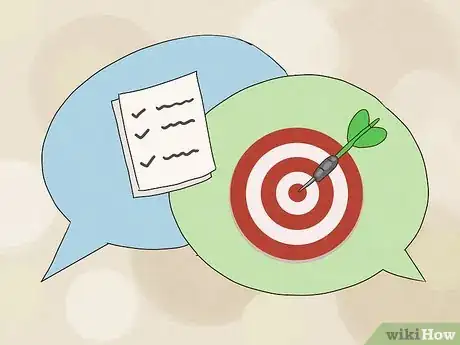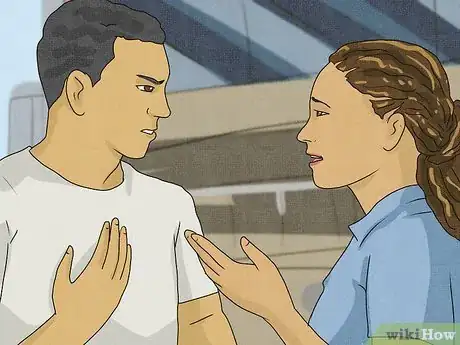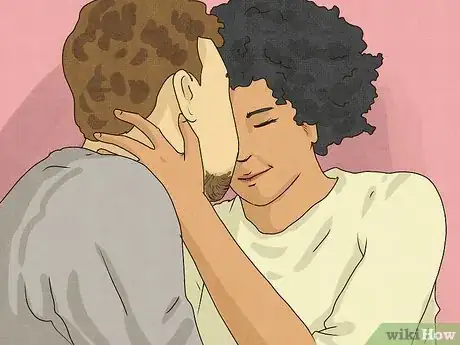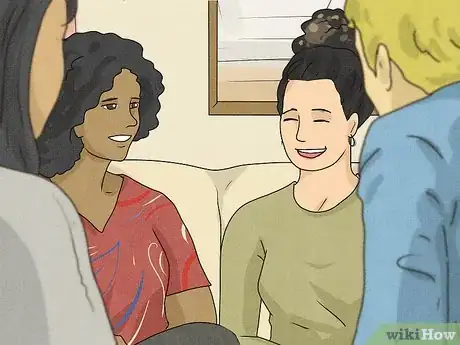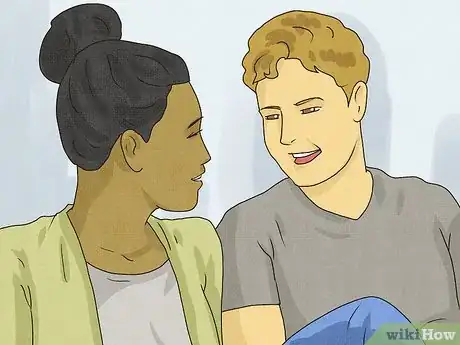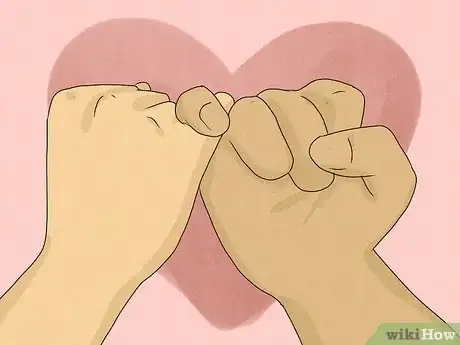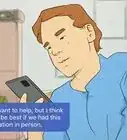This article was co-authored by Sarah Schewitz, PsyD and by wikiHow staff writer, Kira Jan. Sarah Schewitz, Psy.D. is a licensed clinical psychologist by the California Board of Psychology with over 10 years of experience. She received her Psy.D. from the Florida Institute of Technology in 2011. She is the founder of Couples Learn, an online psychology practice helping couples and individuals improve and change their patterns in love and relationships.
There are 12 references cited in this article, which can be found at the bottom of the page.
This article has been viewed 29,943 times.
You might’ve heard the term “emotional availability” get thrown around a lot, but you might not know what it means for your relationship. When you and your partner each have that important quality, it means you’re willing to be open and vulnerable in how you communicate and connect. As you put yourself out there to build a healthy and happy relationship, you might be wondering if your partner is ready to connect in the same way you are. To help you figure it out, we’ve broken down the top signs of emotional availability.
Steps
They talk about their feelings.
-
Is your partner in touch with their emotions? Emotionally available people can put how they’re feeling (both good and bad) into words. When your partner shares their feelings with you, it shows trust. On the flip side, your partner might find it hard to talk about their feelings if they didn’t grow up in a culture or environment that encouraged vulnerability and self-expression. They might express their feelings differently (for instance, they might show you they love you by doing a task for you or giving you a gift).[1] X Research source
- If your partner is reluctant to express their feelings, be patient.
- Encourage them to go on when they do express their emotions and respond kindly: “I really appreciate that you shared that with me.”
- Often, willingness to talk about feelings is linked to attachment styles that people learn from when they’re a child.[2] X Research source However, even if your partner has an insecure attachment style, they can learn to open up with time.
Your communication is consistent and clear.
-
They don’t “ghost” you or leave you guessing about what they’re thinking. Not everyone can send a lightning-fast response back via text, and you might not have deep conversations every time you see your partner. Still, you’ll know they’re emotionally available if you feel secure in knowing you’ll get an honest, thoughtful response from them if you reach out (online or IRL).[3] X Expert Source

Licensed Psychologist Expert Interview. 15 April 2019. Whether it’s scheduling dates or talking about a tough situation, an emotionally available partner matches the effort you put into your conversations together.[4] X Research source- Do they set aside quality time to talk to you?
- Does their body language (making eye contact, nodding, facing you) show you they’re listening?
- Do they talk to you about what’s going on in their life?
You discuss future plans and goals.
-
Sharing hopes, dreams, and aspirations demonstrates openness. It’s an even better sign of emotional availability if they’re willing to discuss future plans specifically involving you and your relationship! After all, studies show that conversations about future goals and values foster closeness, even between strangers.[5] X Research source To get a conversation about the future started, and to get those warm and fuzzy feelings flowing, here are some ideas:
- “What’s something you’ve dreamed about doing for a long time?”
- “If someone could predict what your life would be like in five years, would you want to know? What do you think it would look like?”
They’ve moved on from past relationships.
-
Your partner doesn’t bring “baggage” into your present relationship. Instead, they’ve used their past relationship experience to learn more about how they can be a better partner, as well as what they’re looking for in a future partner. They have realistic expectations for a healthy relationship, and they don’t compare you to their ex.[6] X Research source
You can have productive arguments.
-
Believe it or not, some conflict is healthy (and totally normal). When you and your partner argue, it shows emotional availability because you’re both expressing your own set of needs.[7] X Expert Source

Licensed Psychologist Expert Interview. 15 April 2019. Contrast that with the “silent treatment,” which is a key sign of an emotionally unavailable person. Good conflict prompts you to make a change to better collaborate and address your different perspectives.[8] X Research source To work towards productive conflict, focus on these key strategies:[9] X Research source- Focus on the present and future—what you two can do moving forward, rather than dwelling on the past.
- Use “I feel” statements rather than accusatory comments. For example: “I feel disappointed you couldn’t make it tonight” rather than “You screwed up dinner again.”
- Address one problem or situation at a time.
- Listen to the other person’s perspective.
- Let go of being “right.”
You two can compromise.
-
An emotionally available partner considers your needs.[10] X Expert Source

Licensed Psychologist Expert Interview. 15 April 2019. Go with your gut here, do you feel like there’s a fair give-and-take dynamic between you? When your partner is willing to collaborate by trading ideas and coming up with solutions together, that’s a great sign your relationship has the foundation for a strong emotional connection.[11] X Research source
They have a support system outside your relationship.
-
Do they maintain healthy relationships with friends and family? When your significant other has healthy friendships, it’s a good sign that they have the skills to actively contribute to a relationship and that they’ve learned how to engage with others in a meaningful way. Look at how your partner interacts with the other people in their life.[12] X Trustworthy Source HelpGuide Nonprofit organization dedicated to providing free, evidence-based mental health and wellness resources. Go to source
- Do they regularly communicate with their friends and family?
- Do they express interest in other people’s lives and interests, outside of your relationship?
- How do they treat their friends and family? Do they show care and put effort into those relationships?
You’ve met their friends and family.
-
Introducing you to others means your partner wants to share part of their life with you. By bringing you into other relationships in their life, your partner allows you to gain a better sense of their own values, upbringing, and who they are outside of your dynamic. That being said, if you haven’t met their family yet, don’t panic! Your partner might not be close with their family, their family could live far away, or it might be too soon in the relationship.[13] X Research source
You take turns being the first one to commit.
-
You aren’t the only one moving the relationship forward. Big steps like saying "I love you" for the first time can be scary, but they're important when it comes to openness. Notice how often your partner is willing to take an emotional risk—a situation when they don’t know how you might respond or might face rejection. That’s a key sign of vulnerability and emotional investment into the relationship.[14] X Research source Some other examples of emotional risks include:
- Asking to be “exclusive.”
- Labeling the relationship, whether that means calling yourselves a couple, partners, girlfriend/boyfriend, etc.
- Making plans for the future, like moving in together.
They follow through on their commitments.
-
Do they stick to their promises? Look for past moments when your partner kept their word or showed up for you, even when it was difficult. That’s a sign of emotional availability, respect, and care. On the other hand, it’s normal to not be able to make an event or date once in a while, but chronic flakiness might be a sign of a lack of commitment to the relationship.[15] X Research source
You Might Also Like
 11 Ways to Trigger the Hero Instinct
11 Ways to Trigger the Hero Instinct

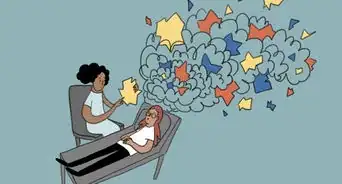

 13 Ways to Not Catch Feelings
13 Ways to Not Catch Feelings

 Here’s Why You Can’t Remember Your Childhood or Teenage Years
Here’s Why You Can’t Remember Your Childhood or Teenage Years

 Should You Talk to Your Crush After Being Rejected?
Should You Talk to Your Crush After Being Rejected?





References
- ↑ https://www.relate.org.uk/relationship-help/help-relationships/communication/my-partner-very-guarded-about-their-emotions-how-do-i-get-them-open
- ↑ https://www.frontiersin.org/articles/10.3389/fpsyg.2015.01069/full
- ↑ Sarah Schewitz, PsyD. Licensed Psychologist. Expert Interview. 15 April 2019.
- ↑ https://www.betterhealth.vic.gov.au/health/HealthyLiving/relationships-and-communication
- ↑ https://journals.sagepub.com/doi/pdf/10.1177/0146167297234003
- ↑ https://www.psychologytoday.com/us/blog/rediscovering-love/201602/10-questions-help-you-tell-if-youre-ready-commit
- ↑ Sarah Schewitz, PsyD. Licensed Psychologist. Expert Interview. 15 April 2019.
- ↑ https://www.psychologytoday.com/us/blog/conscious-communication/201703/why-conflict-is-healthy-relationships
- ↑ https://www.betterhealth.vic.gov.au/health/HealthyLiving/relationships-and-communication
- ↑ Sarah Schewitz, PsyD. Licensed Psychologist. Expert Interview. 15 April 2019.
- ↑ https://www.girlshealth.gov/relationships/healthy/index.html
- ↑ https://www.helpguide.org/articles/relationships-communication/relationship-help.htm
- ↑ https://www.psychologytoday.com/us/blog/emotional-freedom/201408/are-you-in-relationship-unavailable-person
- ↑ https://www.ted.com/talks/brene_brown_the_power_of_vulnerability/transcript?referrer=how_to_sustain_meaningful_relationships_near_and_far
- ↑ https://www.psychologytoday.com/us/articles/200701/field-guide-the-flake
About This Article



